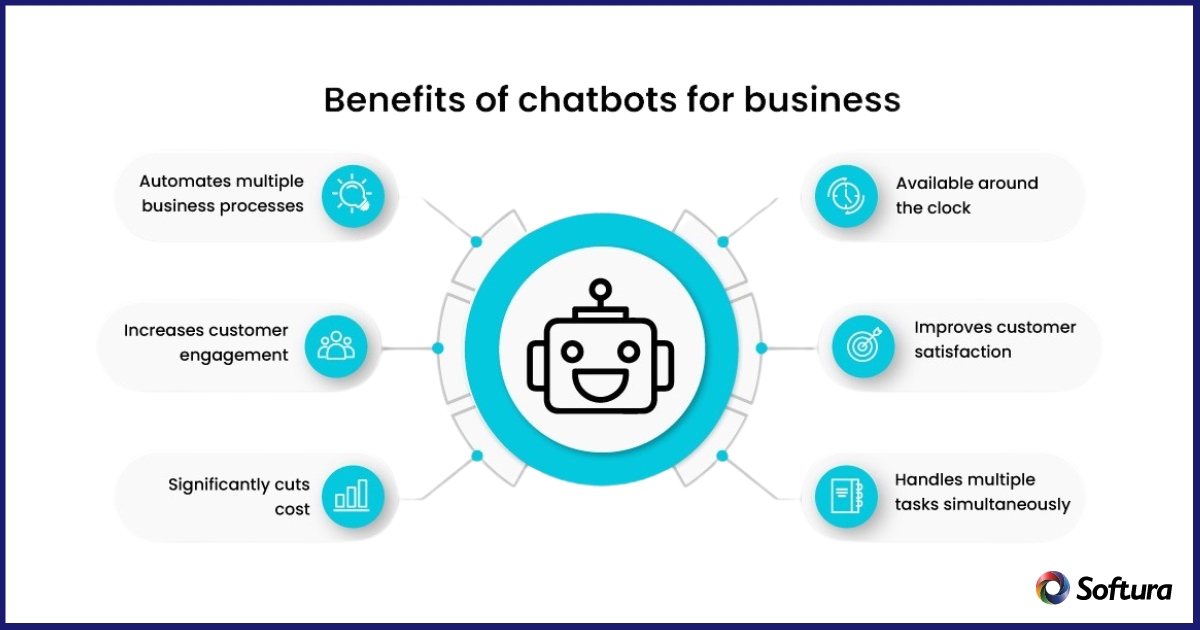In 2024, chatbots are essential for businesses, offering efficient and round-the-clock customer support. With advancements in AI, chatbots enhance customer experiences, handle various tasks, and drive operational efficiency. Adopting chatbots gives businesses a competitive edge in today's market
24/7 Availability
One of the best things about robots is that they can help customers at any time or day. Chatbots don't need breaks, holidays, or sleep like human workers do. This means that customer questions are always answered quickly, no matter what time of day it is. Being available 24 hours a day, seven days a week makes customers happier and can do a lot to improve a business's image.
Domino's Pizza’s "Dom" bot is driven by AI. Dom works perfectly on Facebook Messenger, Twitter, and the Domino's website, among other places. Customers can place orders, follow the progress of deliveries, ask questions about menu items, and even get custom suggestions in real time, all without any help from a person.
So, how did it perform?
Domino's saw a 20% rise in digital orders made through Dom, which shows that the bot works to boost sales. But there are more perks than just purchases. Dom offers customer service 24 hours a day, seven days a week. It answers more than 80% of questions correctly, freeing up human workers to handle more complicated problems. This means that Domino's customers will be happy, and the business will run more smoothly.
Instant Response to Queries
It is possible for chatbots to handle multiple questions at once and respond right away. Customers don't have to wait as long as they would with standard customer service methods because of this speed.
Sephora, a well-known makeup store, knows how important quick service is. Their robot, Sephora Beauty Assistant, can answer a lot of different customer questions right away. The bot takes care of everything in seconds, whether it's suggesting products, telling you where a store is, or tracking your order.
In return, Sephora's call center saw a 40% drop in calls, which freed up real workers to handle more complicated problems. Also, customer happiness scores went up, which shows that fast answers had a good effect.
Personalization
Customer info can be used by chatbots to make conversations more personal. Chatbots can make personalized product suggestions and give tailored help by looking at past exchanges, buy history, and tastes. This makes the customer experience better.
As a global fashion store, H&M saw the need for customization and created "Knix," an AI-powered robot. Knix asks customers about their favorite styles, how they usually shop, and even about events that are coming up.
It then suggests custom clothes, gives style advice, and even helps you find stores nearby that have certain things in stock.
The end result?
Knix's product suggestions led to a 30% rise in click-through rates at H&M. This shows how personalization can help boost sales. Also, customer happiness rates for online transactions went up by 15%, which shows that the change was good for the whole experience.
Data Analytics
Chatbots can record and analyze conversations with customers, which gives companies useful information about their likes, dislikes, actions, and comments. This information can help with making new products, coming up with better marketing plans, and giving better customer service.
Starbucks, the famous coffee shop chain, saw the value in data-driven insights and added a chatbot to their mobile app. The bot not only takes orders, but it also talks to customers and learns about their likes and dislikes, favorite drinks, and even how they feel about different menu items.
Through chatbot communication, Starbucks learned a lot about how customers behaved. It led to focused sales, personalized suggestions, and even the creation of new menu items based on what customers were saying they wanted.
These data-driven projects led to a 15% rise in app usage and a 20% rise in the average order value.
This shows how powerful it is to use robots to learn about your customers.
Chatbot Integration
These days, chatbots can work with many types of business systems, like customer relationship management (CRM) platforms, payment handling systems, and booking systems.
This connection can improve general speed, ease processes, and cut down on mistakes made when entering data by hand.
Hilton Hotels created "Connie," an AI-powered chatbot, to make the guest experience easier. Connie works with many systems, such as Hilton's ticket system and payment method. The hotel's mobile app now has a feature called "Connie" that lets guests check in, ask about services, order room service, and even pay
As a result, Hilton's call center got 30% less busy because guests used Connie to do easy things. Also, guest happiness scores went up, which shows that streamlining contacts had a good effect.
